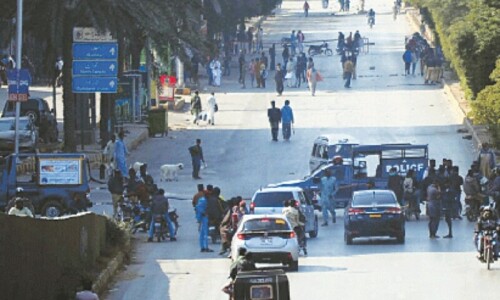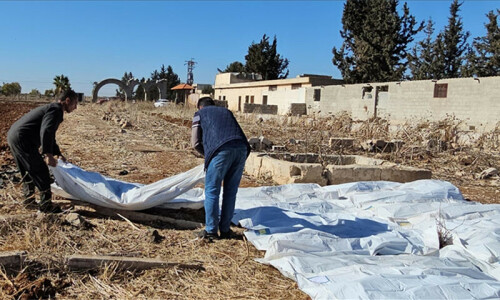KARACHI: While a discussion held on Wednesday in the backdrop of an Indian court judgement remained inconclusive, the impact of drastic reduction in water flows downstream the Kotri barrage — devastating agricultural land and fishermen livelihood, polluting water bodies and an acute lack of freshwater affecting the whole province — echoed at the forum with experts calling for government action.
Tilted ‘The Indus delta: personhood rights of rivers, constitutional acknowledgement and affirmation’, the dialogue was organised by Pakistan Fisherfolk Forum (PFF).
The programme’s objective was to deliberate upon the idea of recognising the River Indus as a “living, legal entity” on similar lines as happened in India this year through a court judgment, which declared Ganga and Yamuna rivers and all their tributaries and streams, as a living entity having the status of a legal person with all corresponding rights, duties and liabilities.
Starting off the discussion, PFF chairperson Mohammad Ali Shah informed the audience about two important recent developments involving two rivers. The first happened in India through a judgment by Uttarakhand High Court and the other in New Zealand, where rivers were recognised as “human beings”.
“The only difference is that it was the parliament in New Zealand which took this historic step and the Maori tribe won recognition for the Whanganui river after 140 years of struggle,” he said, adding that the locals considered the river as an ancestor.
Taking the discussion further, he said the river Indus sustaining millions of lives for centuries deserved the same status.
“We must learn from these examples, collaborate and initiate a campaign, aiming at getting the same status for the river Indus. This would help us restore the past glory of this great water body, which now has been reduced to a lake,’ he said.
He also highlighted the fishermen’s plight in the face of drastic reduction in water flows downstream Kotri barrage and government inaction that had led to increased sea intrusion, devastation of agricultural land and large-scale migration and displacement in Badin and Thatta.
Favouring the idea that a debate should start on the idea of awarding ‘personhood’ status to river Indus, Zulfiqar Halepoto, an activist and author, said that such a step would help focus on the many issues linked to the river and fishermen and expose the real intentions of policy-makers towards water distribution.
He emphasised the need to see how the government was handling the water dispute with India and whether the past legal framework on water distribution in the country was being properly implemented or not.
Ali Arsalan also representing the PFF, however, believed that since the Indus was a transboundary river, the idea needed to be looked into and seen in a broader context. A number of concerns relating to the river, he said, could be effectively addressed if the government implemented provincial laws on environment protection and conservation of forests.
Sharing concerns over fishermen’s shrinking livelihood, he also cited examples of the Gizri Creek whose excess had been restricted by DHA. A number of provincial freshwater bodies were also under the army’s control, he said.
“These are major concerns relating to water bodies and need to be addressed,” he observed.
Some speakers were of the view that a committee should be set-up to deliberate upon the idea and give recommendations on how to push the concept further given the upcoming political developments, including elections.
The subject, they said, could be pursued in the light of government commitments under the Sustainable Development Goals relating to reducing pollution and conserving water bodies.
Ashraf Thama of Human Rights Commission of Pakistan was of the opinion that before taking up judicial activism, the idea to demand a ‘human being’ status for river Indus should be discussed and explored from all angles.
Dr Mukhiar Ahmed Mahar of Sindh University’s centre for coastal and deltaic studies shared the findings of some studies and told the audience how sea intrusion, non-availability of freshwater and steep reduction in groundwater table was affecting people in some districts.
“The river needs sufficient freshwater flows in order to sustain life and livelihood,” he said.
Elahi Baksh of Strengthening Participatory Organisation, advocate Rubina Brohi, MPA Haji Shafi Jamote and Pervaiz Mohammad of Sindh Irrigation and Drainage Authority also spoke.
Published in Dawn, September 28th, 2017















































Dear visitor, the comments section is undergoing an overhaul and will return soon.